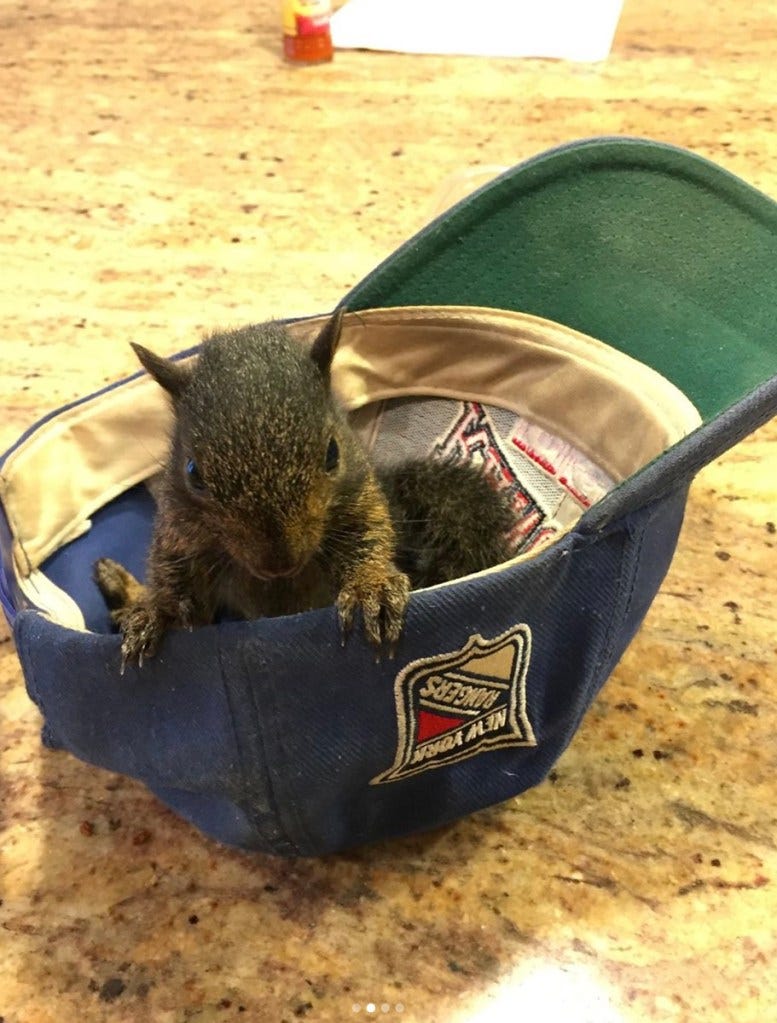Peanut’s Law
Recently, New York State Department of Environmental Conservation (DEC) agents seized and killed a squirrel named Peanut and a raccoon named Fred from their home.
Peanut’s mom got hit by a car leaving Peanut an orphan. As no shelter would take him in, the gentleman who found him raised baby Peanut before attempting to release him back into the wild. Peanut would not leave. Unfortunately, living with wild animals is illegal, even in the case of rescue.
In response to this tragedy, a NYS Assemblymember introduced a bill to change DEC practices. Dubbed “Peanut’s Law,” the bill aims to reform the draconian policies that led to the seizure and killing of Fred and Peanut. We wrote to the NYS Assemblymember asking for amendments to save more animals.
Dear Assemblymember Blumencranz,
On behalf of our New York members and supporters, thank you for introducing changes to Section 11-0512 of the Environmental Conservation Law. What happened to Peanut and Fred is unconscionable.
Unfortunately, the proposed bill will have little impact without additional amendments, as it applies only to sanctuaries. Although it allows an “owner or sanctuary” to contest the seizure, an individual cannot be considered an “owner” without an enabling statute. Furthermore, an appeal to the Department of Environmental Conservation (DEC), the very agency that seized and is threatening to kill these animals, is effectively self-regulation…
We, therefore, request the following amendments:
Restart the grandfather clause for wild animals already in homes. In addition, individuals should be allowed to prove that they had the animals at the start of the grandfather clause period, regardless of whether they applied for a license. Ideally, the bill should also allow for the adoption of certain commensal and gregarious animals, such as squirrels and raccoons, that were orphaned and hand-raised or that, due to injury or illness, cannot be released into the wild. These animals are currently killed, even though they are not suffering mortally and could thrive in homes.
Prohibit DEC from seizing animals from individual homes unless there is clear and convincing evidence of neglect or abuse. Without such evidence, DEC should be required to apply for a court order of seizure, demonstrating why the seizure is necessary to protect public safety or the individual animals involved.
Provide the right to appeal a seizure or destruction order to DEC and then to the courts, regardless of whether the seizure is directed at an individual or a sanctuary.
Prohibit the killing of a seized animal during the pendency of appeals and for the duration of the time frames within which appeals may be filed unless the animal is irremediably suffering. Irremediably suffering should be defined as “an animal with an objectively grave prognosis who cannot live without severe, unremitting physical pain, even with prompt, necessary, and comprehensive veterinary care, as certified in writing by a licensed veterinarian.”
Prohibit the killing of animals who are not suffering if an individual licensed to rehabilitate wildlife under Environmental Conservation Law Section 11-0515(3) agrees to rescue the animal, regardless of whether the animal can be released back into the wild. The bill should also provide licensees with pre-killing notice for such animals.
Sadly, we cannot bring Peanut back. And we will forever remember his killing as many things: tragic and heartbreaking, chief among them. Nothing can alter that reality. However, we can lessen the futility of his death if we learn from it and reform the agency in such a way as to prevent other animals from suffering the same deadly fate.
We look forward to supporting an amended bill and are available to help draft those amendments. Thank you.
Very truly yours,
Nathan J. Winograd


